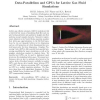Free Online Productivity Tools
i2Speak
i2Symbol
i2OCR
iTex2Img
iWeb2Print
iWeb2Shot
i2Type
iPdf2Split
iPdf2Merge
i2Bopomofo
i2Arabic
i2Style
i2Image
i2PDF
iLatex2Rtf
Sci2ools
177
click to vote
PDPTA
2010
2010
Data-Parallelism and GPUs for Lattice Gas Fluid Simulations
Lattice gas cellular automata (LGCA) models provide a relatively fast means of simulating fluid flow and can give both quantitative and qualitative insights into flow patterns around complex obstacles. Symmetry requirements inherent in the Navier-Stokes equation mandate that lattice-gas approximations to the full field equations be run on triangular lattices in two dimensions and on a 3-D projection of a four dimensional face centred hyper-cubic for three dimensions. Graphics Processing Units (GPUs) offer powerful data-parallel processing capabilities for many simulations as well as the graphics calculations required to simulate them. We describe how GPUs can be used to implement mesh structures for simulating lattice gases. We present performance data on how to optimise data layout in the various levels of localised memory available in modern GPUs and discuss data transfer issues between CPU and GPU and between processing GPU and graphics GPU in a unified simulation platform. We illu...
Distributed And Parallel Computing | GPU Programming Language | GPUs | Lattice Gas Cellular Automata | PDPTA 2010 |
| Added | 14 Feb 2011 |
| Updated | 14 Feb 2011 |
| Type | Journal |
| Year | 2010 |
| Where | PDPTA |
| Authors | Mitchel Johnson, Daniel P. Playne, Kenneth A. Hawick |
Comments (0)

